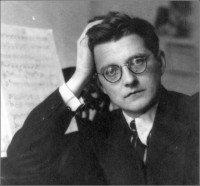This is the first entry in a series that will be posted prior to each concert. This “Concert Preview” will provide background information on the pieces the BSO will perform next. Each Concert Preview is written by the BSO’s Artistic Director and Conductor, Manny Laureano. Look for the next Concert Preview on Monday, September 23.
Scherzo in F-sharp minor, Op. 1 by Dmitri Shostakovich
It is a trait of t he Russian people to historically write about, among other things, irony. Irony is an unexpected outcome. Thus, one of the many ironies in the life of Dmitri Dmitriyevitch Shostakovich is that he should view his childhood almost disdainfully. He writes in his memoirs, entitled Testimony, “For some reason no one writes about the humiliations of childhood. They reminisce tenderly: I was so small and already independent. But in reality, they don’t let you be independent when you’re a child. They dress and undress you, wipe your nose roughly. Childhood is like old age. A man is helpless when he’s old, too. And no one speaks tenderly of old age. Why is childhood any better?” He also writes, “The supposedly marvelous years of youth are made for seeing the world through rose-colored glasses. For seeing merry things and beautiful objects. Clouds, and grass, and flowers. You don’t want to notice that they’re an optical illusion….”
he Russian people to historically write about, among other things, irony. Irony is an unexpected outcome. Thus, one of the many ironies in the life of Dmitri Dmitriyevitch Shostakovich is that he should view his childhood almost disdainfully. He writes in his memoirs, entitled Testimony, “For some reason no one writes about the humiliations of childhood. They reminisce tenderly: I was so small and already independent. But in reality, they don’t let you be independent when you’re a child. They dress and undress you, wipe your nose roughly. Childhood is like old age. A man is helpless when he’s old, too. And no one speaks tenderly of old age. Why is childhood any better?” He also writes, “The supposedly marvelous years of youth are made for seeing the world through rose-colored glasses. For seeing merry things and beautiful objects. Clouds, and grass, and flowers. You don’t want to notice that they’re an optical illusion….”
Clearly the charming music that flowed from his pen at the still-tender age of 13 after having been under the tutelage of Ignatiy Glyasser and then Alexandra Rosanova seemingly belies the notion that his childhood was anything less then cheerful. Also, one has to recognize that his views on childhood are colored by a life lived mostly under an oppressive political system.
The music itself is childlike in its outward simplicity from the light flute solo that begins it to it’s imitative motives that dance about from trumpet to violins to woodwinds. The middle contrasting section wanders much as the attention of a young boy sitting in class pausing to look away from the teacher to the window wishing he were outside playing. The bombast is reminiscent of the larger orchestrations of fellow Russian, Nikolai Rimsky-Korsakov. What is impressive to the careful ear is the sheer amount of detail present in the piece which is discoverable upon multiple hearings of the piece.
